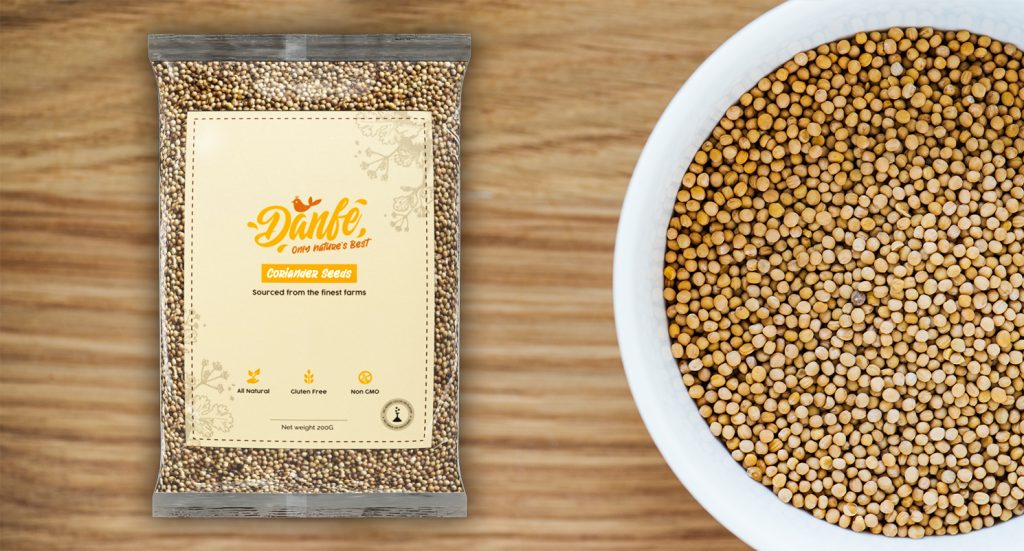Surprising Health Benefits of Coriander Seeds
BY DANFE |

Coriander comes from the Coriandrum sativum plant and is related to parsley, carrots, and celery. It is known to have originated from Southern Europe, North Africa, and West Asia. It was also cultivated in the Hanging Gardens of Babylon. Being a popular plant, it was consumed in Ancient Egypt and Greece on a regular basis. To date, it is among the most popular flavor booster that is used in the preparation of various dishes across the globe. Coriander seeds are brown, fat, and round. The hollow cavity of these seeds consists of essential oils that lend flavor to the dishes during cooking. The harvesting occurs when the plant turns brown and its leaves begin to dry and fall. Immature seeds are light green in color and taste bitter.
Coriander is commonly known as dhania in India and is used in the preparation of diverse regional cuisines to flavor curries, stir-fries, snacks, and more. In Mexico and the Southwestern part of the USA, it is used in salsas, mixed greens, burritos, and more. While the fresh leaves are popularly used as a fresh garnish on most dishes, the seeds and ground powder are used while cooking. Along with being a popular spice in the kitchen, these seeds are also well-known for their medicinal properties.
In Ayurveda, it is often recommended for stomach-related ailments and is known to ease digestion. Its regular use can offer several health benefits. Below are some reasons why you should include it in your daily diet.

Image source: Pinterest
Benefits of Coriander Seeds
Helps lower blood sugar levels
Blood sugar level may be kept under control with the help of coriander seeds’ extract and oils. People with low blood sugar or who take medication for diabetes should cautiously consume coriander because it’s effective in lowering blood sugar. According to several studies, coriander seeds help reduce blood sugar by promoting enzyme activity that helps remove sugar from the blood.
Filled with immune-boosting agents
Coriander consists of antioxidants that help prevent cellular damage caused due to free radicals. Its antioxidants have been known to fight inflammation in the body. According to studies, compounds like terpinene, quercetin and tocopherols may have immune-boosting and neuroprotective effects.
Help control cholesterol levels
According to Indrani Subramanian, Apollo Hospitals, Kolkata, “Coriander seeds contain a compound called coriandrin that controls the process of lipid digestion, as a result bringing down our cholesterol levels”. According to Ayurveda, the seeds have a potent effect on the way the body digests food and absorbs fat, hence, it is advisable to use coriander to keep cholesterol levels under control.
Image source: Pinterest
Aids in curing cold and flu
Coriander seeds consist of vitamins like folic acid, vitamin A and beta-carotene, and vitamin C. According to Madhavi Rathod of Vedic Healing, coriander leaves and seeds contain nearly 30% of the everyday suggested measure of vitamin C, which helps in curing a cold and flu.
Helps promote digestion
Coriander seed oils may help accelerate and promote digestion. In an eight-week study, 32 people with irritable bowel syndrome (IBS) found that 30 drops of a coriander-containing herbal medication, if taken daily for three times a day, significantly helped decrease abdominal pain, bloating, and discomfort. The extracts from coriander are also used as an appetite stimulant in traditional Iranian medicine.
Image source: Pinterest
Coriander is an antioxidant-rich herb that has several culinary uses and health benefits. It may help lower your blood sugar, fight infections, and promote heart health, digestive health, and more. These seeds can be easily added to your diet. Most of the above studies have been conducted using concentrated extracts, therefore it is not too clear if coriander seeds help reap exactly the same benefits when consumed.




